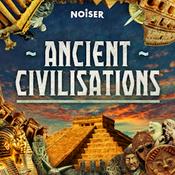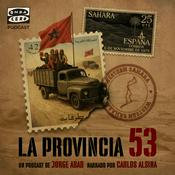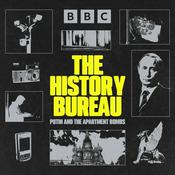50 episodios
Episode 50. How Stable Rules, Hard Money, And Risky Voyages Fed A City And Forged Democracy
10/2/2026 | 54 minSend a text
Athens didn’t have rich soil or gentle rivers. It had something better: rules, money, and the will to turn strangers into partners. We dive into how a city on the brink of class conflict reinvented itself with Solon’s radical debt relief, stable legal reforms, and a pro-trade agenda that turned olive oil, silver, and contracts into a lifeline of grain from the Black Sea.
We unpack the mechanics behind bottomry loans and why lenders accepted shipwreck risk for 22–30% returns, the one-day jury system that made written contracts king, and the antitrust-like case against grain dealers whose cartel nearly choked the city’s food supply. Along the way, we track the rise of the Athenian drachma as a de facto reserve currency—thanks to Laurion’s rich silver and the Attic standard—showing how high-purity coins cut transaction frictions, attracted capital, and projected power across the Mediterranean. This is policy as infrastructure: law courts as ports, predictable interest customs as lighthouses, and currency integrity as a navy of trust.
We also zoom into mining finance and foreclosure drama: syndicates funding prospecting and extraction, harsh clauses that flipped missed payments into permanent loss, and trapeza bankers matching lenders to voyages while handling foreign exchange. The throughline is incentive design. When the city set clear rules, protected contracts, and kept its money credible, private capital did the hard work of feeding Athens and building its navy. It’s a playbook with modern resonance—price controls vs throughput, sovereignty vs trade, and why enforcing agreements is the quiet engine of prosperity.
If this story of scarcity turned strategy resonates, follow the show, share with a friend who loves economic history, and leave a review telling us which Athenian policy you’d try today.
Support the show
To support the podcast through Patreon https://www.patreon.com/HistoryOfMoneyBankingTrade
Visit us at https://moneybankingtrade.com/
Visit us on YouTube https://www.youtube.com/@MoneyBankingTradeEpisode 49. Solon's Revolution: Transforming Athens' Debt Crisis into a Democratic Blueprint
20/1/2026 | 58 minSend us a text
A city on the brink, a ledger of promises, and a small stamped disc that rewired power: this is the story of how Athens turned a debt disaster into durable institutions. We follow the thread from Sumerian clay tablets and royal clean slates to Lydian electrum nuggets and the silver coins that made prices visible to anyone with a hand and a purse. Along the way, we unpack why farmers pledged their own fields, how default created debt bondage that drained hoplite ranks, and why rulers from Mesopotamia to Attica treated debt policy as national security.
We walk through Draco’s stark step toward public law, the rise of money changers at the trapezai, and the quiet genius of standardized weights and measures. Then comes Solon, elected with extraordinary powers to “shake off the burdens.” He canceled noncommercial debts, ended debt slavery, reorganized citizenship by wealth, expanded access to assembly and courts, and promoted olive oil exports that pushed Athenian trade across the Mediterranean. He didn’t wage war on money; he disciplined it, preserving a customary ten percent interest while curbing the practices that turned citizens into collateral.
The result is a blueprint for how law, finance, and geography shape each other. Coinage lowered transaction costs and broadcast civic identity; predictable courts and public statutes converted private leverage into public legitimacy; and measured relief restored free labor and military strength. We also confront the limits: women, enslaved people, and resident foreigners remained outside the political body even as the economy diversified. Still, the pattern holds a modern echo—prosperity requires both hard money and trusted rules, especially when shocks magnify inequality and risk.
If stories of ancient credit, coinage, and constitutional creativity spark your curiosity, press play, then share the episode with a friend who loves history and economics. Subscribe for more deep dives, and leave a review with the one lesson you think today’s economies should relearn from Solon’s Athens.
Support the show
To support the podcast through Patreon https://www.patreon.com/HistoryOfMoneyBankingTrade
Visit us at https://moneybankingtrade.com/
Visit us on YouTube https://www.youtube.com/@MoneyBankingTrade- Send us a text
Coins did what speeches couldn’t: they moved power across seas. We follow the rise of Greek silver as it financed fleets, paid jurors and rowers, and turned owls and gods into portable propaganda. Along the way, we pull apart the messy mechanics—clashing standards, missing denominations, and the birth of bankers who priced trust at simple tables in the Agora.
We dig into why Athenian silver outcompeted Persia’s gold, how taxes and fines created network effects, and why Sparta bet on iron to starve luxury and bribes. Beneath the shine sits a hard cost: enslaved labor in lethal mines that fed treasuries and liquidity. From the myth of barter to the reality of credit, ledgers, and letters of credit, we map how ancient finance enabled long-distance trade without hauling sacks of coin, and how metic bankers—often outsiders—built FX services, safeguarded deposits, and extended secured loans that smoothed consumption and seeded growth.
Risk and interest become characters of their own. Sea loans commanded high rates, philosophers attacked accumulation, and states discovered the dark arts of debasement. Athens’ long run of silver integrity stands against Rome’s slide and Ptolemy‘s deliberate dilution. We unpack counterfeiting methods, mint tech, and the ongoing cat-and-mouse between trust and fraud—from shaved edges to modern identity theft and laundering. Finally, we show how standardized coin wages converted time into money, expanded planning horizons, and shifted status from lineage to ledger, nudging dozens of city-states toward forms of democracy. Money’s true alloy is trust, law, and force; where those hold, markets scale and societies change.
If this journey reshaped how you think about money, banking, and power, follow the show, share it with a friend, and leave a quick review so others can find us.
Support the show
To support the podcast through Patreon https://www.patreon.com/HistoryOfMoneyBankingTrade
Visit us at https://moneybankingtrade.com/
Visit us on YouTube https://www.youtube.com/@MoneyBankingTrade - Send us a text
Ships got faster, markets thickened, and stamped silver began doing political work that speeches couldn’t. We follow how Greek city-states turned metal into money and money into power—financing fleets, paying jurors and rowers, and turning owls and gods into portable propaganda. Seigniorage became public revenue, the Agora became a humming marketplace, and social mobility crept in as status shifted from lineage to ledger.
We dig into the messy mechanics: clashing weight standards, missing denominations, and the rise of "trapezites" who sat at simple tables and priced trust for a fee. Athens bankrolled prestige by paying Olympic and Isthmian champions, proving that sports funding is ancient soft power. Philosophers pushed back; Aristotle’s fear of endless accumulation echoes today’s debates over fiduciary duty, environmental costs, and the obligations of wealth. Persia minted the gold daric yet watched Greek silver dominate circulation through network effects, while city-states navigated debasement and emergency bronze issues by anchoring coins to taxes and fines.
One city refused the current: Sparta, with heavy iron money designed to choke off luxury and bribery. That austere system depended on helots and periokoi, revealing how military readiness and economic insulation fed each other. We also confront the human cost of liquidity—Laurion’s mines powered the money supply through enslaved labor in lethal conditions—alongside a broader view of credit and risk. Barter myths fall away as we map gift economies, ledgers, letters of credit, and the hard truth that when war rises, interest rates and metal hoards rise with it. If this journey through ancient finance and power made you rethink money’s true alloy—trust, law, and force—follow the show, share it with a friend, and leave a quick review to help others find us.
Support the show
To support the podcast through Patreon https://www.patreon.com/HistoryOfMoneyBankingTrade
Visit us at https://moneybankingtrade.com/
Visit us on YouTube https://www.youtube.com/@MoneyBankingTrade - Send us a text
Ships got faster, roads stretched farther, and fear did the rest. We follow Greece from the ashes of the Late Bronze Age collapse to a world where stamped silver didn’t just buy grain and oarsmen—it built fleets, financed wars, and rewired how people thought about law, status, and freedom. Lydia may have minted first, but Ionia made coinage a habit, turning measured metal into everyday money that paid juries, rowers, craftsmen, and mercenaries. As the Agora shifted from public debate to humming marketplace, Athens funded its ambitions through Laurion silver, tribute from subject cities, fines, and liturgies assigned to the wealthy—sidestepping direct taxes while scaling a maritime empire.
Mercenaries accelerated the revolution. States needed reliable payrolls, and coins beat IOUs on campaign. Carthage, long tied to ingots, minted in Sicily to pay Greek soldiers, proving how war can force monetary innovation. Seigniorage powered city-states: mints captured the spread between face value and metal cost, turning coinage into civic revenue. Designs mattered. Owls, gods, and later Alexander’s portrait broadcast identity and legitimacy, turning currency into portable propaganda. Silver dominated daily life because it divided cleanly and traveled well; gold stayed in hoards, dowries, and high diplomacy. Where coin circulation rose, money velocity jumped, markets thickened, and specialized labor took root.
Beneath the metal ran ideas. The Axial Age brought written laws, standardized measures, and a new respect for reasoned order—perfect companions to standardized money. Numisma, rooted in law, framed coins as instruments of justice as much as exchange. Monetization loosened rigid hierarchies: birth ceded ground to balance sheets, and social mobility edged in without revolution. From owls to armies, from hoards to harbors, this story shows how money’s most durable alloy is trust, law, and the hard calculus of power.
If this journey through ancient finance, warfare, and markets sparked new questions, follow and share the show, and leave a review with the one idea you’ll be debating at your next dinner.
Support the show
To support the podcast through Patreon https://www.patreon.com/HistoryOfMoneyBankingTrade
Visit us at https://moneybankingtrade.com/
Visit us on YouTube https://www.youtube.com/@MoneyBankingTrade
Más podcasts de Historia
Podcasts a la moda de Historia
Acerca de History of Money, Banking, and Trade
A historical look at the development and evolution of money, banking, and trade. From the ancient civilizations to the present.
Sitio web del podcastEscucha History of Money, Banking, and Trade, Chisme Mitológico y muchos más podcasts de todo el mundo con la aplicación de radio.net

Descarga la app gratuita: radio.net
- Añadir radios y podcasts a favoritos
- Transmisión por Wi-Fi y Bluetooth
- Carplay & Android Auto compatible
- Muchas otras funciones de la app
Descarga la app gratuita: radio.net
- Añadir radios y podcasts a favoritos
- Transmisión por Wi-Fi y Bluetooth
- Carplay & Android Auto compatible
- Muchas otras funciones de la app


History of Money, Banking, and Trade
Escanea el código,
Descarga la app,
Escucha.
Descarga la app,
Escucha.






































